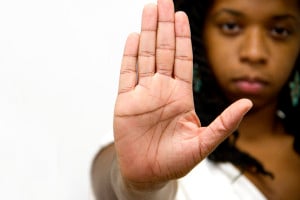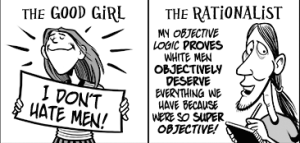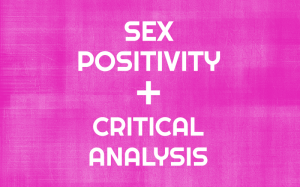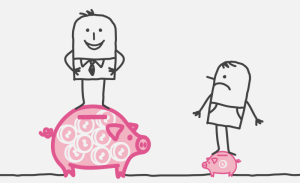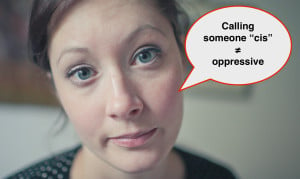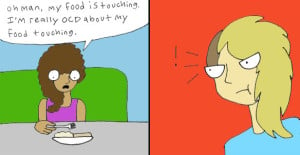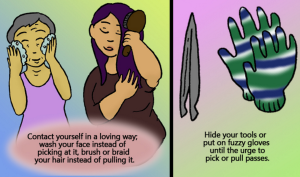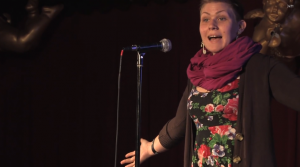In the disability rights movement, we have an issue: Abled people seem to believe that they know what disabled people should call themselves more than actual disabled people.
Sounds obviously problematic, right?
Unfortunately, even those most committed to disability rights commit this error all the time.
I first realized this was a problem when I was paying my bill at a restaurant and the waitress noticed my shirt: ‘Autism: It’s not a processing error, it’s a different operating system.’
“Oh, wow!” she said, her face lighting up. “You know, my brother has autism!”
“Really?!” I asked her, excited to meet another sibling. “My sister, Caley, is Autistic, too!”
“What a coincidence!” she said. “Is your sister high functioning or low functioning?”
“…you know, she actually doesn’t like functioning labels,” I replied, my joy suddenly dampening. “She says that they generalize too much.”
“Oh, so she’s high functioning, then,” the waitress immediately replied.
Instead of taking my sister’s identity language concerns seriously, she swatted them aside – without even thinking about it.
Almost every disabled person has encountered a scenario similar to this. You see, there’s been this movement against pejorative or limiting labeling of disabled people by professionals and peers alike. That’s a movement that Caley and I are all in favor of.
Unfortunately, however, it’s been hijacked to the point that instead of amplifying the voices of disabled people, abled people attempting to be allies are overwriting them.
Families, professionals, friends – we all too often inadvertently fall into this category.
“Labels go on soup cans, not people,” these well-meaning people say. “You mean you’re a person with a disability, not a disabled person,” they add.
“We need to see the person first, not the disability, and when you call yourself a disabled person, it makes disability seem like the most important thing about you. And besides, you’re not disabled, you’re differently abled.”
The problem isn’t with the fact that there’s debate.
The problem is when disabled people are shut down by abled people for using the identifying language of their choosing, rather than the language that the abled person prefers.
In this case, the waitress didn’t intentionally ignore my use of my sister’s preferred identity language. It honestly didn’t even occur to her that she should respect my sister’s requests. Instead she took my response as the answer to her question.
In this article, my sister Caley and I are going to address the ways able people police disabled people’s language, and what you can do to help make society more friendly to disability-related language choices.
Below are several common, and completely inappropriate, things that abled people say to validate speaking over disabled people.
1. “I’m Advocating for the Way I Want Someone with a Disability to Be Viewed”
Without realizing it, you actually just said the same thing twice.
As Caley says “That’s kind of funny, because if you think about it, the person in front of them is advocating for how they, as a disabled person, want to be viewed.”
By not accepting the use of the language they’re using to describe themselves, you’re substituting the way you want them to feel for the way they actually feel.
And that’s harmful because it invalidates their feelings and, just as bad, assumes they aren’t competent enough to make up their own minds about their identities.
2. “Everyone Uses a Certain Type of Language in My Profession – It’s Best Practice”
Caley says: “Do your patients/students actually want you to do that? You don’t know until you ask. Ask them, not their parents.”
I know that in the profession I am entering, speech language pathology, person first language is the norm.
Yet, when it comes to autism, I try to respect the views of the autistic people I know, particularly my sister, and use identity first language as my default.
Of course, I switch to person first language whenever I meet someone on the spectrum who prefers that, but honestly, those experiences have been few and far between.
However, when I respect their views and use identity first language, it’s honestly perceived as rather aberrant and can literally lower my grade on assignments. True, in some contexts I run into (addressing parents and professionals), person first language does seem to be the preferred.
However, mandating that everyone use one form of language when it’s something that so many people disagree with is not okay.
The key is this: when I meet a person on the autism spectrum who prefers person first language, I use person first language. Otherwise, I use identity first language.
There’s this perception that by using only person first language, we’re standing up for and supporting disabled people. But here’s the thing. We need to be flexible and change our language to show our respect for how the disabled person we’re addressed identifies – not what our profession prefers.
3. “I’m Just Being Supportive!”
If you’re ignoring someone else’s wishes for how they wish to be discussed, then you’re not being supportive. You’re actually pushing them down.
“You can be supportive by actually referring to people in the way that they wish to be,” Caley says.
Nothing else is supportive; it’s pushing your version of reality onto everyone else.
Being a feminist means respecting others’ choices, and being an ally to disabled people means respecting their self-advocacy.
When we take their identity and substitute our own perceptions of how it “should” be, we’re about as far from being an ally as we can get. In fact, that’s actually incredibly ableist.
4. “The Language Practice They Use Is a Horrible Way to Think of Yourself”
“We need to have an entirely different conversation about how disability doesn’t have to be bad and people can own it,” Caley says – which is how people who use identity first speech tend to feel.
Sometimes such language can be blunt. Referring to oneself as “crippled,” for instance, is particularly controversy-raising.
However, that is a judgment left up to the individual – as it should be.
After all, this is their identity, not yours.
5. “I Reserve the Right to Refer to Them with the Language I Want to Use”
Caley answered this rather honestly by saying: “And I reserve the right to refer to you in the language I prefer as well, then. Hint: It starts with an ‘in’ and ends with a ‘sensitive.'”
There’s been this backlash against being “politically correct,” but honestly, referring to a person the way they want to be referred to shouldn’t be controversial – that’s just common courtesy.
***
So now that you better understand the problem, you might be wondering what you can do to help.
Here are some suggestions:
1. Respect Disabled People’s Language Choices
Caley says, “If they want person first, refer to them with person first. If they want identity first, use identity first. Not that hard. Also known as, just be nice!”
This applies not only to the identity first vs person first debate but to all disability identity related language choices. Treat disabled people’s words like you would want your own to be treated.
2. Be an Advocate, But Seek Permission First
“Make sure your advocacy is wanted. I had a resident assistant my first year at college who decided to make a board all about disability. And one of the things it said about autism among the other ‘interesting’ information was to use person-first language. Except I had been very clear the entire time that I prefer identity first,” said Caley.
More than that, I saw the poster board and felt like a terrible sister for never having used person first speech to refer to Caley.
So, without asking her, I went out and gave speeches about the importance of using person first, not realizing that Caley didn’t like person first speech.
Make sure you’re amplifying a disabled person’s voice, rather than speaking over them.
***
That’s it – the solution for this problem is that simple.
It’s up to us, now, to implement that. So the next time someone tells you a disabled person tells you they do or don’t want you to refer to them in a certain way, or uses identity language you don’t use yourself, respect them – don’t correct them.
[do_widget id=’text-101′]
Caley Farinas is a Contributing Writer for Everyday Feminism. She’s a recent graduate with a Bachelor’s in Public Health who writes about the effect society has on the “disabled.” Caley writes from her experience as an Autistic woman with dysgraphia and anxiety disorders. Because of these disabilities, it is hard for her to write and she gets assistance from her sister Creigh in writing/typing. That said, any words that you see attributed to her are her own, and she edits and approves anything her sister Creigh types. You can see more of Caley and Creigh’s writing on their website Autism Spectrum Explained and their Facebook page.
Creigh Farinas is a Contributing Writer for Everyday Feminism. She’s a graduate student pursuing a Master’s degree in Speech Language Pathology and who already has a B.A. in Psychology and a post-baccalaureate in Communication Sciences and Disorders. Creigh is still learning more every day, and her sister Caley reads, edits, and approves everything that Creigh writes about disabilities. You can see more of Creigh and Caley’s writing at Autism Spectrum Explained.
Search our 3000+ articles!
Read our articles about:
Our online racial justice training
Used by hundreds of universities, non-profits, and businesses.
Click to learn more


